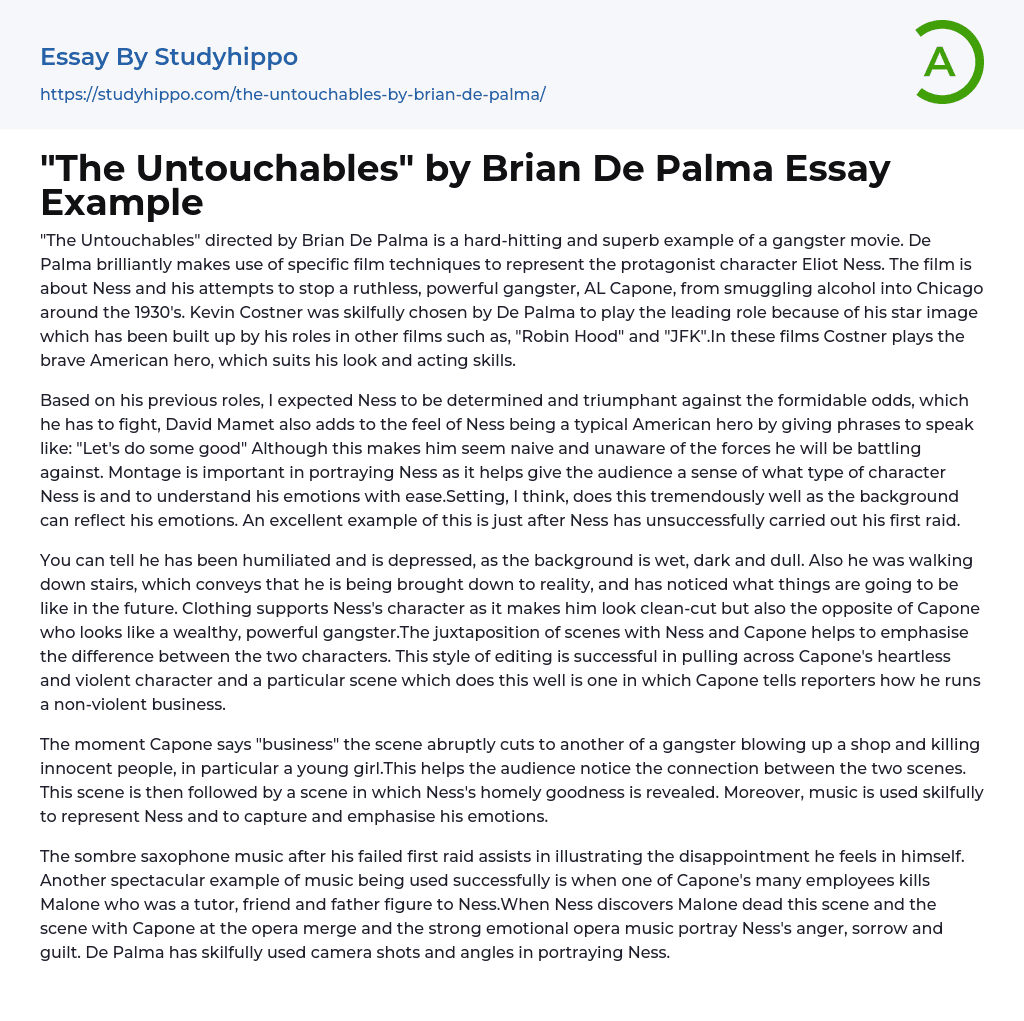Brian De Palma's "The Untouchables" is a remarkable example of a gangster movie, showcasing the efforts of protagonist Eliot Ness as he combats notorious bootlegger, AL Capone, in 1930s Chicago. De Palma employs various film techniques to effectively portray Ness, with Kevin Costner adeptly cast in the lead due to his established star image as a courageous hero from his roles in "Robin Hood" and "JFK".
Ness was expected to be determined and triumphant, given his previous roles, even against formidable odds. David Mamet's portrayal of Ness as a typical American hero with phrases like "Let's do some good" adds to this perception, albeit making him seem naive about the challenges he will face. The use of montage is crucial in presenting Ness's character and emotions to the audience. The setting serves this purpose exceptionally well, with the background reflecting his
...feelings. For instance, after an unsuccessful raid, the setting effectively mirrors Ness's emotions.
Noticeable from the scene is Ness's humiliation and depression, evident from the wet, dark, and dull background, and walking down the stairs that symbolize his realization of the harsh reality. Moreover, Ness's clothing portrays him as neat and trim, unlike Capone, who appears to be a wealthy and powerful gangster. The contrast in scenes between Ness and Capone accentuates their distinctions. This editing style effectively showcases Capone's cruelty and brutality, particularly in a scene where he boasts to reporters about his non-violent business.
When Capone mentions "business", there is an abrupt cut to another scene showing a gangster destroying a shop and taking innocent lives, including a young girl. This creates a link between the two scenes for the audience
to observe. Following this, the next scene highlights Ness's kind personality. Additionally, music is utilized effectively to represent Ness and intensify his emotions.
The use of music in "The Untouchables" is a powerful tool in conveying emotions and enhancing the story. For example, after a failed raid, sombre saxophone music reflects Ness's disappointment in himself. Likewise, emotional opera music merges with the scenes of Malone's death and Capone at the opera, emphasizing Ness's anger, sorrow, and guilt. Director De Palma also utilizes camera shots and angles to skillfully portray Ness.
Within the scene where Ness is chasing Nitty, the main theme revolves around avenging Malone's death. This scene comprises of various camera angles and shots that convey Ness's power shift and increased ruthlessness compared to the beginning of the film. The low-angle shot displays Ness's dominance over Nitty as he dangles from the building. Conversely, the high angle shot showcases Nitty's vulnerability and weakness, allowing Ness to take full control over his life. Mamet's skillful use of dialogue helps De Palma present Eliot Ness's character in a superior manner. The final extreme close-up leaves the audience questioning whether Ness will take his revenge and shoot in cold blood or not.
The opening scene of the film depicts Ness as naive, unfamiliar with the magnitude of his opponents, and often ridiculed. This is shown when Ness utters the words: "Let's do some good." At this point, he is regarded as a fool and not a threat by reporters, police officers, and especially Capone. However, in a subsequent scene at the Canadian border during his second raid attempt, Ness accompanies the Canadian Mounted Police and shoots someone for the first
time. This turns the tables on his image, establishing his reputation as a formidable adversary.
In the scene where Ness confronts a dead gangster, he passionately screams three rhetorical questions that illustrate his anger and regret. When the Mounted Police Chief expresses disapproval of Ness's methods, he responds with the retort, "You're not from Chicago." This exchange highlights Ness's development as a character and his realization that he must use violence to combat violence. Throughout the film, Ness forms and loses numerous relationships, providing insight into his complex persona. Despite this, he remains a devoted and loving husband and father, as evidenced by his wife's supportive note and comforting gestures on his first day of work.
Malone played a crucial role in helping Ness triumph over Capone. Their bond was so strong that Ness regarded Malone as both a trusted friend and father figure. When Malone met a tragic end, Ness was left devastated. Brian De Palma brilliantly portrayed the character of Eliot Ness, utilizing various techniques to deliver a captivating and authentic gangster movie experience. Personally, I found "The Untouchables" to be emotionally stirring and entertaining, earning it my highest praise.
- The Pursuit Of Happiness essays
- 12 Angry Men essays
- A beautiful mind essays
- A Separation essays
- Alfred Hitchcock essays
- American Beauty essays
- American Films essays
- Animation essays
- Avatar essays
- Blade Runner essays
- Bollywood essays
- Bond essays
- Bridge essays
- Cinema Of The United States essays
- Comedies essays
- David essays
- Dead Poets Society essays
- Do The Right Thing essays
- Documentary essays
- English-Language Films essays
- Erin Brockovich essays
- Film Analysis essays
- Film Editing essays
- Film Noir essays
- Film Techniques essays
- Finding Forrester essays
- Forrest Gump essays
- Gattaca essays
- Gladiator essays
- Glory essays
- Good Will Hunting essays
- Hamilton essays
- Hollywood essays
- Horror essays
- Jaws essays
- King kong essays
- Like Water For Chocolate essays
- Looking For Alibrandi essays
- Martin Scorsese essays
- Melodrama essays
- Monster essays
- Moulin rouge essays
- Movie Analysis essays
- Movie Review essays
- On The Waterfront essays
- One Flew Over The Cuckoo'S Nest essays
- Our day out essays
- Pearl Harbor (Movie) essays
- Persepolis essays
- Pornography essays




